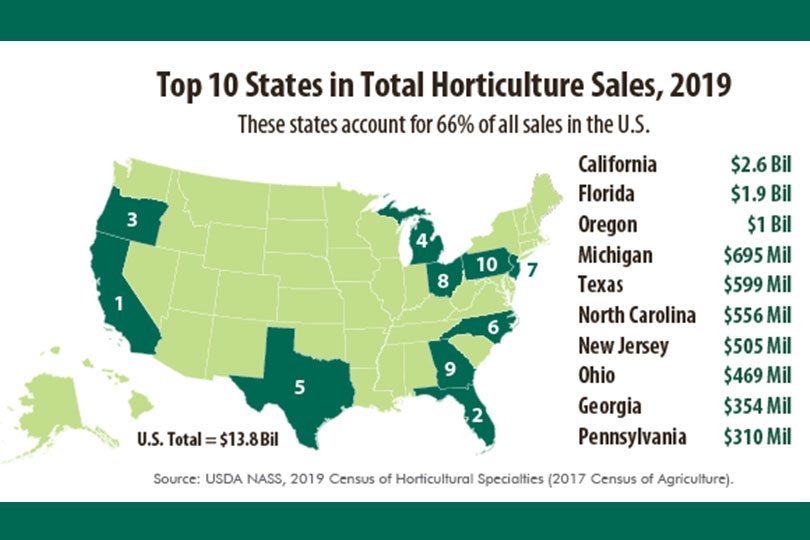The U.S. Department of Agriculture’s (USDA) National Agricultural Statistics Service (NASS) released the 2019 Census of Horticultural Specialties report, the only source of detailed production and sales data for horticulture, floriculture, nursery and specialty crops for the entire United States.
The data show that horticulture operations sold a total of $13.8 billion in floriculture, nursery and specialty crops in 2019, down fractionally from the sales in 2014. The number of horticulture operations in the U.S. decreased 11 percent during this time to 20,655.
“First conducted in 1889, the horticulture census provides data on sectors for which there are no other comprehensive data sources,” NASS Administrator Hubert Hamer said. “It is a valuable tool to highlight the contribution horticulture growers bring to our local, state, and national economies as well as changes in the industry over the past five years.”
Horticulture production occurred primarily in 10 states, which accounted for 66 percent of all U.S. horticulture sales in 2019.
California at $2.63 billion, Florida at $1.93 billion and Oregon at $1.02 billion led the nation in sales.
Texas was fifth in the nation with $599 million in sales.
The top commodities in U.S. horticulture sales in 2019, and compared to 2014, were:
- Nursery stock, $4.55 billion, up 7 percent
- Annual bedding/garden plants, $2.24 billion, down 13 percent
- Sod, sprigs and plugs, $1.27 billion, up 12 percent
- Potted flowering plants, $1.2 billion, up 11 percent
- Potted herbaceous perennials, $923 million, down 2 percent
- Propagative horticultural materials, bareroot, and unfinished plant materials, $720 million, up 4 percent
- Food crops under protection, $703 million, down 12 percent
Other key findings from the 2019 Census of Horticultural Specialties report show that family- or individually-owned operations made up the largest number of operations, accounting for 52 percent. Corporately-owned operations accounted for 75% of sales or $10.3 billion.
Total industry expenses were up 6 percent since 2014, with labor being the largest cost, accounting for 42 percent of total expenses in 2019.
The Census of Horticultural Specialties is part of the larger Census of Agriculture program. It provides information on the number and types of establishments engaged in horticultural production, value of sales, varieties of products, production expenses and more. All operations that reported producing and selling $10,000 or more of horticultural crops on the 2017 Census of Agriculture were included in this special study.
For more information and to access the full report, visit www.nass.usda.gov/AgCensus.

